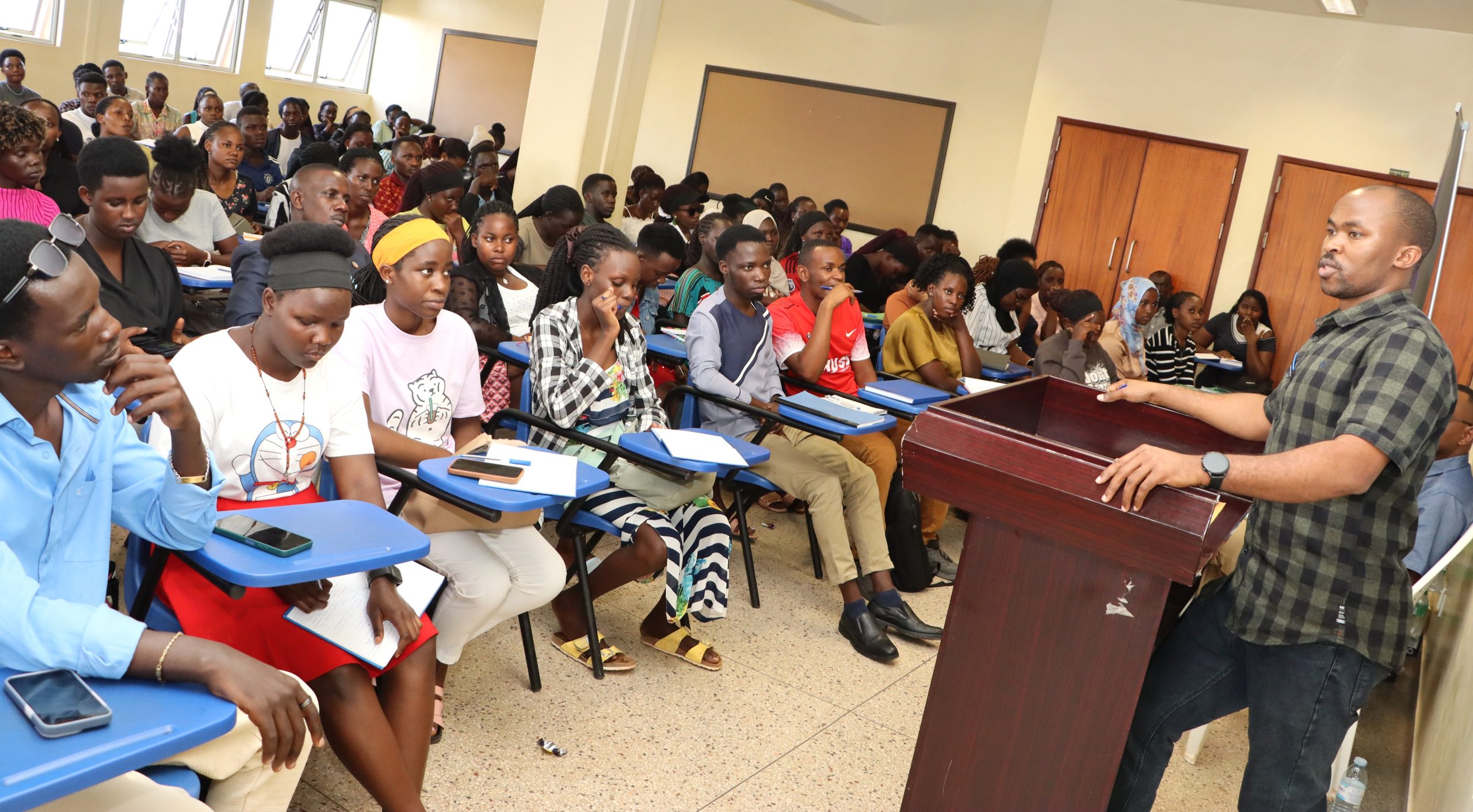By Jane Anyango
Makerere University, Kampala | 29 September 2025
Over 300 students from the Department of Political Science and Public Administration at Makerere University attended an orientation session organized by the Great Lakes Centre for the Study of the United States, a newly established academic initiative aimed at deepening Uganda–U.S. relations through education, research, and scholarly collaboration.
Held at the Frank Kalimuzo Central Teaching Facility on 29th August 2025, the orientation focused primarily on first-year students and introduced them to the Centre’s mission, objectives, and the various opportunities available to them. The session was facilitated by Centre researchers Dr. George Okiror, Mr. Denis Okumu, and Mr. Charles Tweheyo, who offered an in-depth overview of the Centre’s background and programming.
A revival of the historic relationship between Uganda and America – Charles Tweheyo
In his address, Mr. Tweheyo emphasized that the Centre’s establishment in 2025 represents a revival of longstanding academic and professional ties between Uganda and the United States. These relations, he noted, date as far back as the 1940s—well before Uganda gained independence in 1962. He explained that collaborations between the U.S. and the Great Lakes region of Africa historically involved four key fields: the social sciences, natural sciences, humanities, and technology. He cited examples such as the Fulbright Scholarships and Carnegie-supported programs that enabled Ugandans to study and conduct research in the United States over several decades.
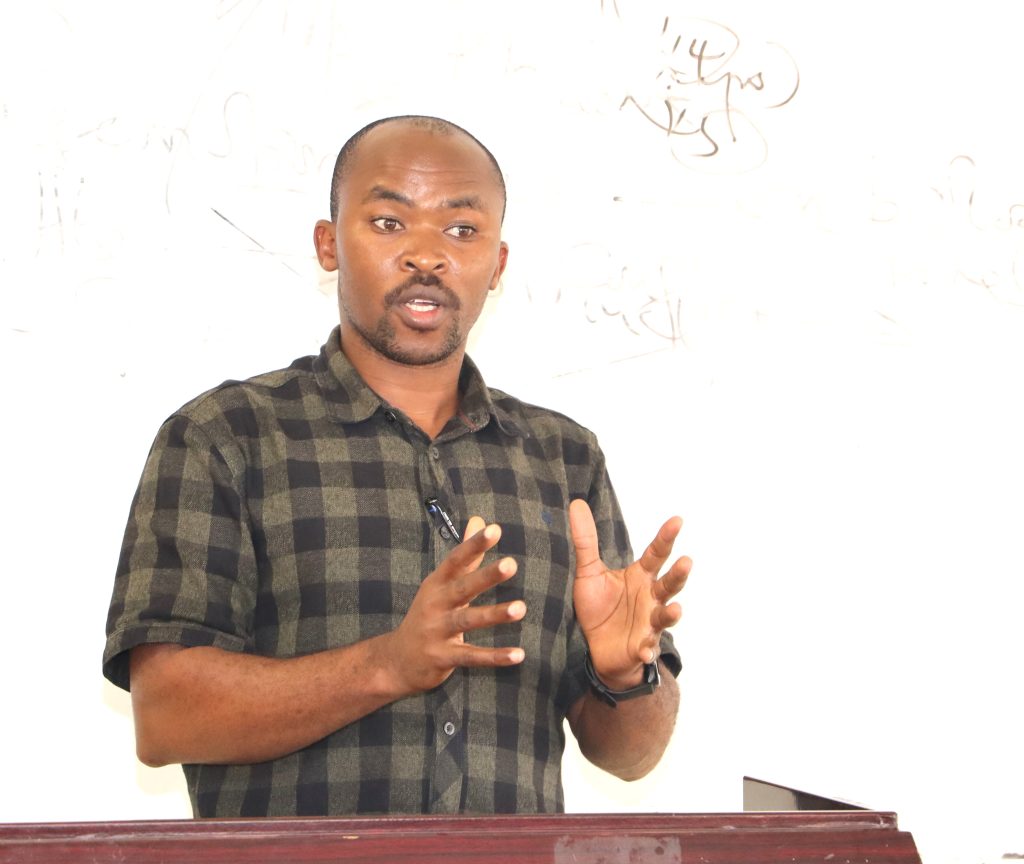
Tweheyo informed students that the orientation was not merely ceremonial but served a practical purpose: helping them understand the Centre’s agenda and positioning themselves for future academic and research opportunities. He made it clear that while international exchanges and scholarships are possible, they require deliberate student engagement and academic readiness. “There is no way you can be identified if you have not positioned yourself,” he said. “Wouldn’t you want to spend three months in the U.S. understanding its social culture? You can—but only if you’re prepared.”
He explained that the Centre’s work is anchored in four strategic areas: creating dialogue between scholars and professionals from both regions, fostering professional partnerships, supporting collaborative research, and facilitating academic exchange. These objectives are designed to strengthen knowledge-sharing and build mutual understanding between the U.S. and the Great Lakes region, especially through student-centered programs.
The Great Lakes Centre for the Study of the United States was officially launched on 25 March 2025 by the Vice Chancellor of Makerere University in collaboration with the U.S. Ambassador to Uganda. Since then, it has been institutionalized under the Department of Political Science and Public Administration, which also serves as the host department. The Centre is led by Professor Paul Omach, who serves as both its Director and Head of the Department. Other key figures include Dr. Edward Silvestri Kawesi, the Principal Investigator and lead coordinator, and Professor Kasaija Phillip Apuuli, who serves as Co-Principal Investigator.
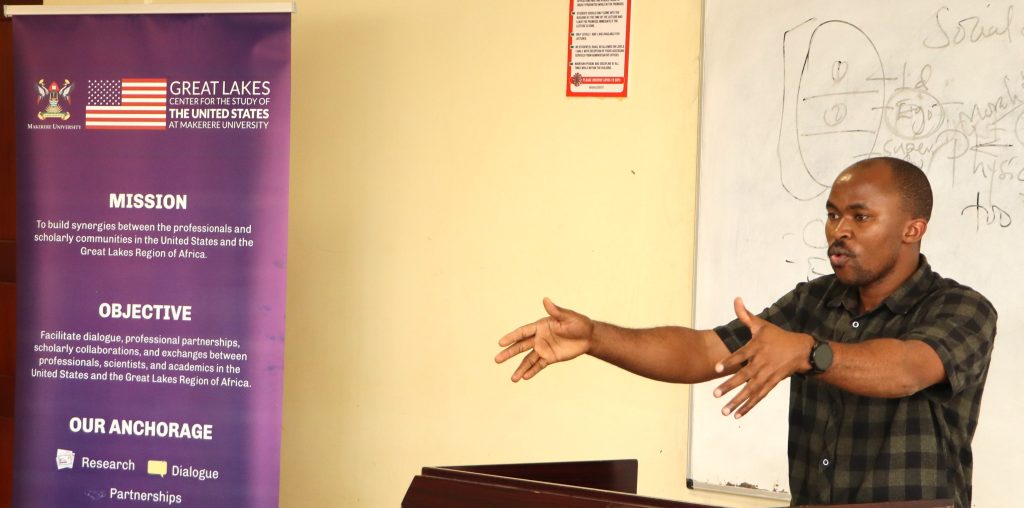
Since its launch, the Centre has initiated six research projects that are currently underway and are expected to produce results by September 2026. According to Tweheyo, these projects are being supported through expert mentorship in proposal writing, data collection, analysis, and academic publishing. The Centre also provides logistical support, including allowances, to ensure researchers can carry out their work effectively.
In addition to its research activities, the Centre has hosted several public dialogues and facilitated connections between Makerere scholars and their counterparts in the United States. Collaborative projects are already emerging, including one in the arts sector where a Makerere academic is working with an American counterpart to develop a joint music initiative. Tweheyo explained that such projects are consistent with the longstanding tradition of U.S.–Uganda cooperation in the humanities.
He stressed that students must take ownership of the Centre’s mission and use it as a resource for their academic development. “This Centre is here for you,” he told them. “Your input, your participation, and your ideas are all welcome. If you have something to contribute that can help the Centre grow, we encourage you to step forward.”
Tweheyo encouraged students to take academic excellence seriously and to begin positioning themselves for international research collaborations and exchange programs. He emphasized that through the Centre, Makerere students now have a unique gateway to becoming globally engaged scholars—but that the first step must be taken by the students themselves.
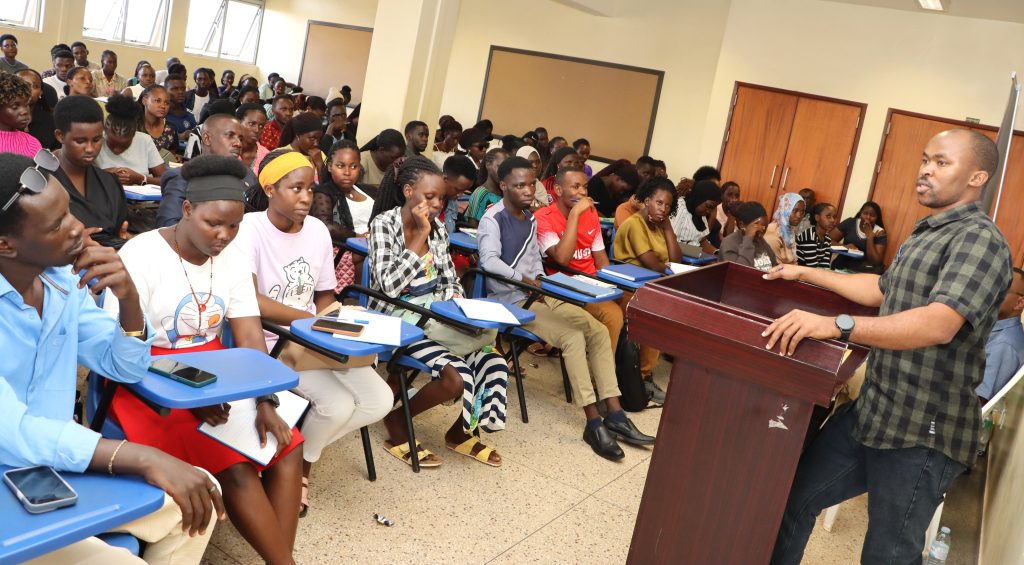
He concluded with a call for feedback from students regarding their expectations from the Centre, which organizers said would be used to shape future programs tailored to student interests.
U.S. Study Centre as a Gateway to Global Engagement– Denis Okumu
Denis Okumu, a researcher at Makerere University’s Great Lakes Centre for the Study of the United States, called on students to seize the rare opportunity presented by the newly established Centre to position themselves for international exposure, research partnerships, and leadership development. Okumu delivered an impassioned and wide-ranging presentation on the strategic importance of the Centre and the life-changing opportunities it offers.
He began by emphasizing that the Centre, officially launched in March 2025, is not only the first of its kind in Uganda but also the only one in the entire Great Lakes region. “We are not talking about something common,” he said. “This is a privilege to Makerere University—a platform through which sustainable relationships between the U.S. and Africa can be built.”
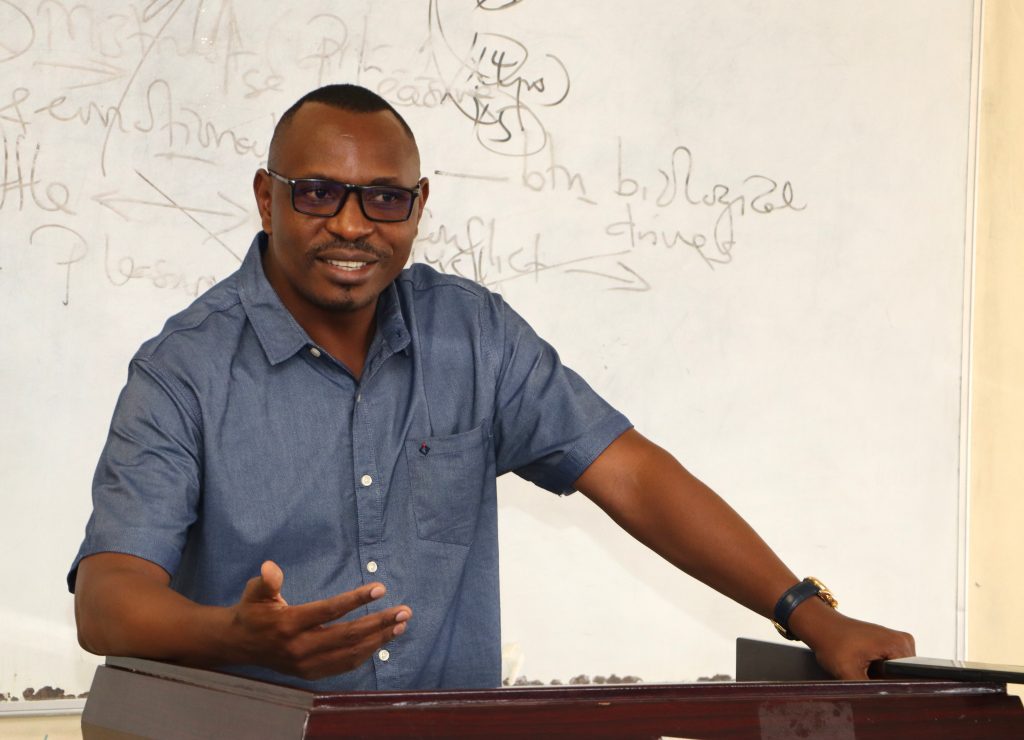
Tracing the roots of U.S.–Uganda educational ties, Okumu recounted how the Fulbright Scholarship program was introduced shortly after Uganda’s independence in the 1960s, with notable beneficiaries such as Professor Senteza Kajubi, a former Vice-Chancellor of Makerere and one of Uganda’s foremost educationists. He lamented the eventual decline of such programs but expressed optimism that the Centre’s creation represents a renewed chapter in these bilateral academic relations.
“After independence, the U.S. sought influence through education. That’s why they offered Fulbright Scholarships. They understood that you cannot be civilised alone—you must recruit others,” he said, explaining how education has historically served as a soft-power tool in shaping global influence.
Okumu highlighted that the Centre is designed to foster four key areas of engagement: dialogue, professional partnerships, collaborative research, and academic exchanges. These, he said, are essential for creating long-term, meaningful connections between Ugandan scholars and their American counterparts.
He urged students to take an active role in the Centre’s initiatives, stressing that their future relevance in global discussions will depend on their willingness to participate in knowledge creation and cultural exchange. “You are the generation that must sustain this relationship,” he told the students. “If we are to have meaningful engagement, we must prepare you to become relevant actors on the global stage.”
One major avenue for student benefit, he explained, will be through research. The Centre is currently coordinating several research projects ranging from constitutional democracy to cultural diplomacy with the goal of producing insights into U.S.–Uganda relations. Okumu emphasized that students would be recruited as research assistants and mentored in proposal writing, data analysis, and academic publishing.
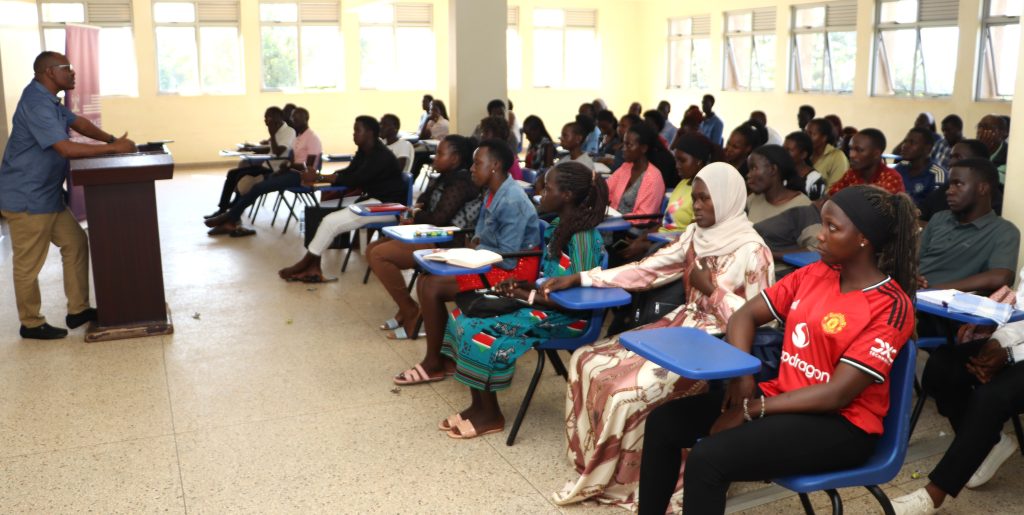
He announced that students should expect regular opportunities to interact with visiting American scholars, including an upcoming month-long visit by a professor from the University of South Florida. Such scholars will support students in refining their research interests and navigating the global academic space.
In addition to research, Okumu outlined a wide range of student-focused activities meant to broaden their understanding of university life and global culture. Among these is the introduction of curated movie nights showcasing the experiences of university students in the United States, followed by moderated discussions. “You’ll be entertained, but also challenged to reflect—how does a young person live in the U.S., and how can that inspire how you carry yourself here?” he posed.
Okumu noted the cultural contrast between the independence expected of American students—most of whom finance their own education and are fully self-reliant by age 18—and the dependency that characterizes many African university students. These cross-cultural insights, he said, are crucial in shaping a more intentional and responsible student community at Makerere.
He also spoke about the Centre’s commitment to leadership and skills development, including helping students translate academic knowledge into real-world impact. “One of our goals is to help you learn how to turn ideas into projects that solve problems in your communities,” he said. The Centre, he explained, will support students in learning how to draft compelling proposals, secure funding, and build initiatives that mirror successful models such as the U.S. Peace Corps.
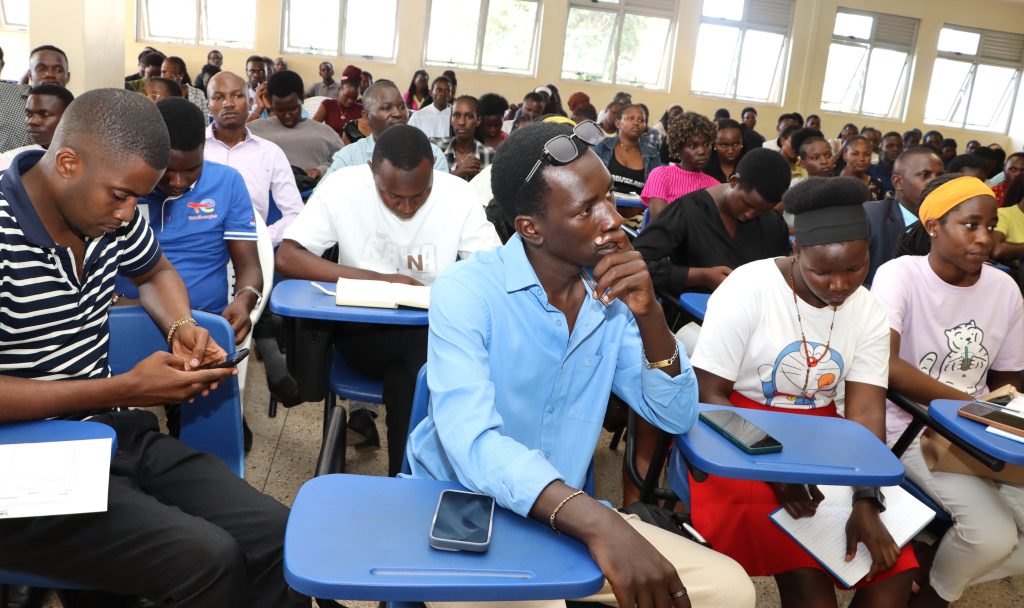
Okumu revealed that the Centre is already researching the Peace Corps’ legacy in Uganda and examining how its model of community service can be adapted to the Ugandan context. “Imagine finishing Harvard and being sent to a rural African community for a year. That’s how Americans shape their future leaders. We want to create a similar experience here.”
In the coming months, the Centre will host public dialogues and virtual events on critical global issues, including one focused on the U.S.–Russia–Ukraine conflict and its implications for Africa. Okumu emphasized that such international dynamics have a direct effect on Ugandans, especially in areas like food security, given that Ukraine is a major exporter of wheat and agricultural inputs. “We want you to understand that what happens globally affects what you eat, what you wear, and how your future unfolds.”
In an example of cultural diplomacy, Okumu also previewed an upcoming virtual event with Grammy-winning jazz professor Lewis from the University of Florida, who will discuss the role of jazz music in advancing civil liberties in America. Makerere’s own Dr. Sempijja will co-host the session to explore how jazz can inspire similar movements in Uganda. “Music can be a platform for expressing dissatisfaction with a system—it’s a form of civic dialogue,” he said.
Okumu made it clear that the Centre is not just about academic theory but also about real-world application. From mentoring to networking to resource access, the Centre is positioning itself as a hub where young people can be groomed into thoughtful leaders, global citizens, and community change agents.
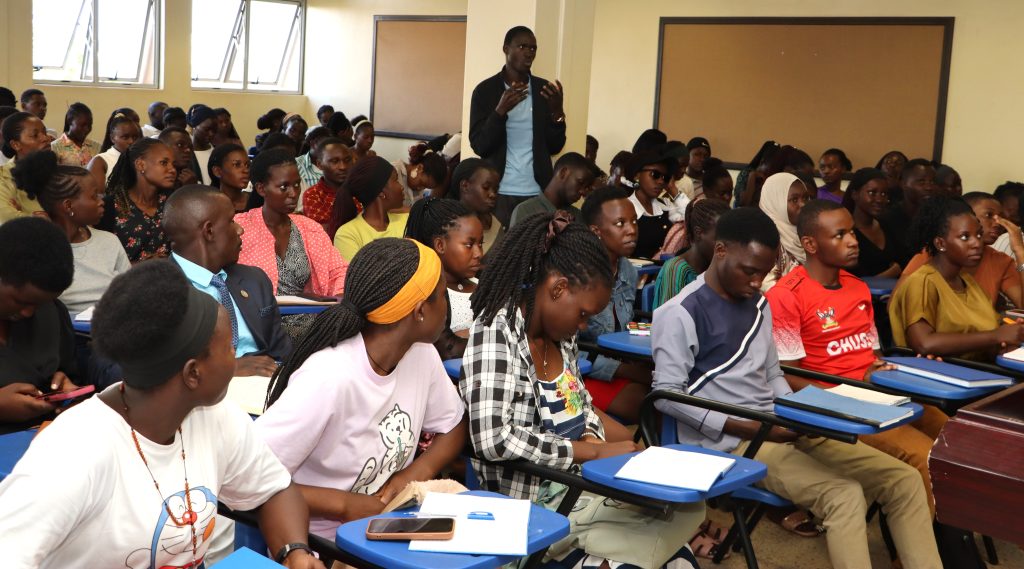
He concluded by calling on students to take the Centre seriously and participate actively in its programs. “This Centre exists for you. Whether it’s research, cultural events, mentorship, or international exchange, you are the core beneficiaries. But you must show commitment. The world won’t just come to you—you must be ready to meet it halfway.”
The session ended with a call for continued student engagement in shaping the Centre’s programs. As Okumu put it, “We are here to support you. But the first move has to come from you.”
A Shift in Scholarly Focus: “We Study The USA Not The Other Way Around” — Dr. George Okiror
In a landmark shift for academic inquiry and global engagement, Makerere University’s Great Lakes Center for the Study of the United States is now turning the lens back on the world’s superpower – America.
Speaking to students, Dr. George Okiror, a senior lecturer and research coordinator at the center, emphasized that the initiative marks a major departure from traditional academic norms.
“Previously, it has been the Americans studying us,” Dr. Okiror stated. “But it is now our turn to study them.”
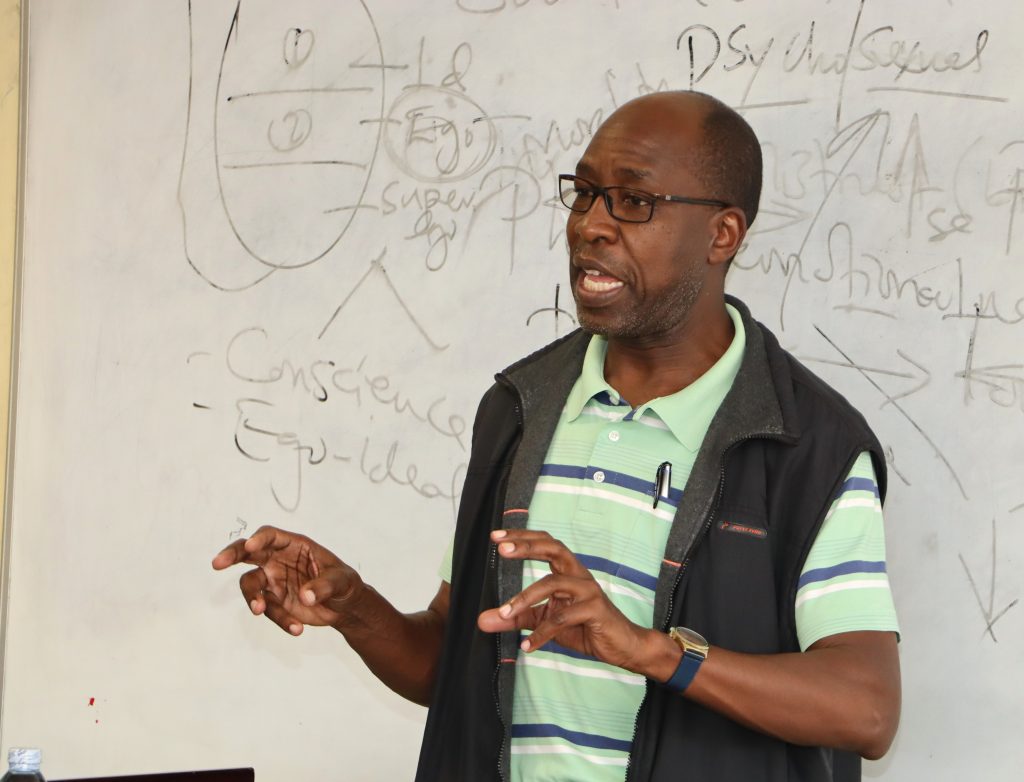
The center, which was launched earlier this year with support from the U.S. Embassy, is the only one of its kind in the Great Lakes region. It aims to facilitate scholarly collaboration, public dialogue, and student engagement on themes that explore the United States from African perspectives.
Dr. Okiror underscored that the purpose of the center is not to romanticize America, but to engage critically with both its strengths and its flaws.
“We study them not just to admire, but also to learn from what has gone right and avoid what has gone wrong,” he said.
He noted that while the U.S. is known for its wealth and innovation, it also grapples with challenges like homelessness, poverty, and drug abuse — problems familiar to many Ugandans. “Researching the U.S. allows us to reflect on our own society while engaging the world,” he added.
Students at the Centre of Research
Highlighting the critical role students will play, Dr. Okiror revealed that undergraduate involvement is key to achieving the center’s goals. He pointed out that all second-year political science students are required to take Social Research Methods — a course he teaches — as a foundation for deeper research work.
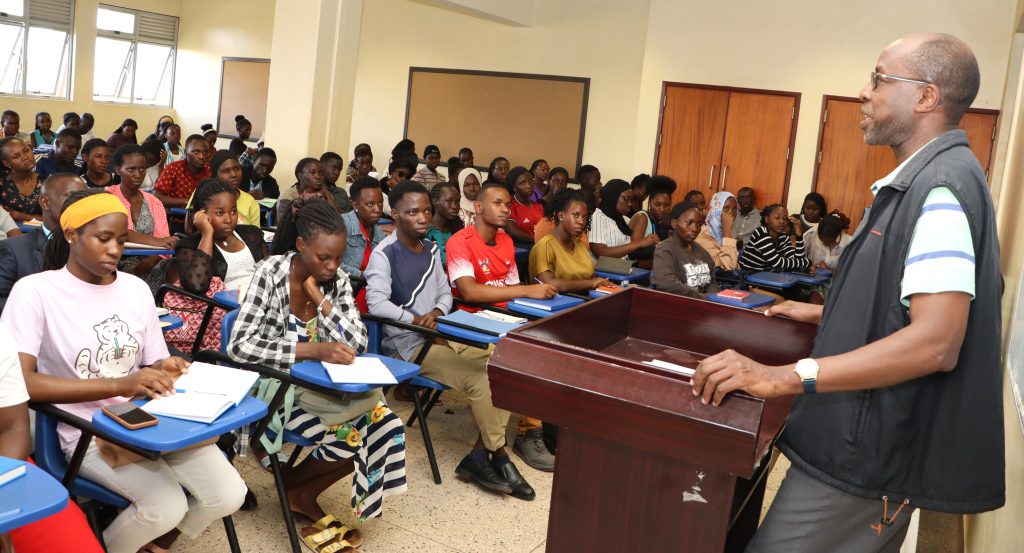
“This is not just theory. This is your opportunity to begin thinking about real research topics that can benefit the center, the university, and your own communities,” he told the students.
Students will also be engaged as research assistants on ongoing projects, potentially earning stipends and gaining practical experience in field research. “You won’t be used without your efforts being rewarded,” he assured.
Dr. Okiror emphasized that the center’s work aligns with Makerere’s larger ambition to become a globally recognized research institution. “Research is about knowledge generation, curiosity, and being informed,” he explained. “It allows us to understand the world and to make our voices heard within it.”
He called on students to seize the opportunity, urging them to position themselves not just as learners but as future scholars who can contribute to shaping East Africa’s intellectual and developmental landscape.
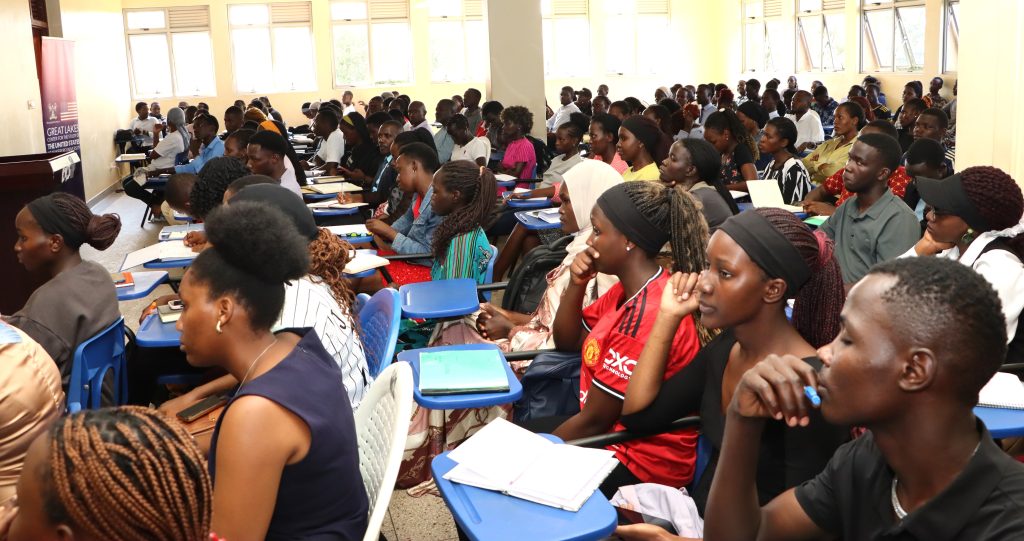
“I am getting to the evening of my time at Makerere,” Dr. Okiror concluded. “It is now your time to take up the responsibility. Welcome to the family of researchers.”
The Great Lakes Center for the Study of the United States will continue to roll out activities including virtual dialogues with American universities, themed movie nights, guest lectures, and collaborative research projects. With its student-centered approach, the center promises to be a hub for transformative learning and international engagement at Makerere.

